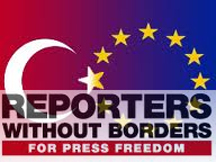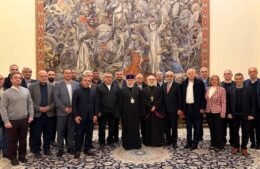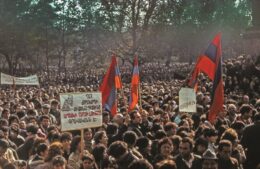INSIDE THE TURKISH GOVERNMENT’S PROPAGANDA MACHINE
- (0)
\n
INSIDE THE TURKISH GOVERNMENT’S PROPAGANDA MACHINE –
\n
By Kate O’Sullivan and Laura Benitez
\n
\n
When it came to foreign affairs, the Anadolu Agency has a more relaxed approach; it has correspondents worldwide, and they are free to report on events from anywhere they wanted. Of course, there were a few guidelines to consider: Never mention the Armenian genocide, UK jihadist fighters heading to Syria do not come via Istanbul, and Russia should be condemned for funding the Syrian regime (but not too much, as Turkey likes its oil and gas).
\n
\n
 “Journalists wanted for international news agency,” read the Guardian job ad. As an editor in an industry where legitimate opportunities are few and far between, you apply for pretty much any full-time job you see, so apply we did. A couple of months later, we arrived in Ankara, Turkey, ready to “write history” as the first international journalists to be welcomed into the Anadolu Agency (AA) family.
“Journalists wanted for international news agency,” read the Guardian job ad. As an editor in an industry where legitimate opportunities are few and far between, you apply for pretty much any full-time job you see, so apply we did. A couple of months later, we arrived in Ankara, Turkey, ready to “write history” as the first international journalists to be welcomed into the Anadolu Agency (AA) family.
\n
We joined the agency in January, supposedly to edit English-language news, but quickly found ourselves becoming English-language spin doctors. The AA’s editorial line on domestic politics—and Syria—was so intently pro-government that we might as well have been writing press releases. Two months into the job, we listened to Deputy Prime Minister Bülent Arınç talking some shit about press freedom from an event at London’s Chatham House, downplaying the number of imprisoned journalists in Turkey. Soon after that, we got the chance to visit London on business. We grabbed it and resigned as soon as we hit UK soil.
\n
Established in 1920, the AA was once a point of national pride. Today, it’s at the end of one of the many sets of strings in the ruling AK Party’s puppet parade. Most of Turkey’s TV stations are heavily influenced by the state, and the few opposition channels can expect to have their licenses revoked at any time or be banned from broadcasting key events, such as live election footage or anything that might detract from how fantastic the government is doing.
\n
For example, Turkey’s media regulator, RTUK, fined the networks that aired footage of last year’s Gezi Park protests. Funnily enough, the watchdog is made up of nine “elected” members nominated by political parties—and the more seats in parliament a faction has, the more influence it possesses.
\n
Media outlets that aren’t being hounded by RTUK can always look forward to direct intervention from Prime Minister Tayyip Erdogan himself. In 2009, independent mogul Aydin Dogan’s media group—made up of various newspapers and TV channels, CNN Türk, and a news agency—wasfined $2.5 billion for evading taxes. Incidentally, the audit came just after one of the group’s platforms published news on the Lighthouse charity scandal, which saw a German court convict three Turkish businessmen for funnelling $28.3 million into their personal accounts.
\n
In one recent leaked recording, Erdogan is heard asking his former justice minister to ensure that Dogan be punished. Since then, the Dogan empire has been bound and gagged accordingly.
\n
\n
The international media relies increasingly on local sources when reporting domestic affairs overseas. The Gezi protests aside—which had nearly as many “live blogs” as protesters—much of Turkey’s English-language news came via Today’s Zaman, the largest English-language newspaper in Turkey. The leadership of the Zaman newsgroup is closely linked with the Islamic teacher and international education mogul Fethullah Gulen, a former ally of the AK Party who now lives in self-imposed exile in Pennsylvania.
\n
The Zaman media group also owns Turkish-language newspaper Zaman, the Cihan news agency, and various other publications and websites. Written in good, accessible English, and featuring Western humor and Istanbul-minded opinions, Today’s Zaman provided international eyes with a window into Turkey’s domestic affairs while also serving as a pro-government mouthpiece. That status quo was upset when Erdogan and Gulen fell out—reportedly over Gulen’s influence on the country—and the whole partnership came crashing down.
\n
A few years and a number of leaked wiretaps later, the Zaman newsgroup—whose top brass arereportedly members of Gulen’s religious movement—has shifted sides and started to sling mud at Erdogan. Clearly, this would no longer work as a primary news channel for Western journalists; the government needed a new agency that could provide source material for the international media—one that Erdogan’s cronies had complete control over.
\n
Enter the AA, its English-language editors, and a new director general, Kemal Ozturk—the former press adviser to Erdogan, government cabinet wannabe, and allegedly the proud owner of a quarter of the agency’s shares. The remaining 75 percent belong to the Treasury, according to Aydın Ayaydın, an Istanbul deputy for the opposition party CHP. The AA maintains it is a private company, with less than 50 percent of shares held by the treasury, and so never gets audited, even though it receives public money. As we were told when we asked about finances in a meeting, “Nobody really knows who owns all the shares—they have been passed down from [former Turkish president Mustafa] Ataturk.”
\n
With exclusive access to ministers—some of whom could be found eagerly posing for photographs on the blue carpet leading to the agency’s doors—reporting on domestic affairs was as simple as picking up a phone. Sourcing and fact-checking, often the most difficult part of a journalist’s job, were also a breeze. “The foreign minister told me, so yes, it’s true”—no second source needed. The domestic news editing policy was, essentially: Don’t ask questions. Ever.
\n
When it came to foreign affairs, the AA has a more relaxed approach; it has correspondents worldwide, and they are free to report on events from anywhere they wanted. Of course, there were a few guidelines to consider: Never mention the Armenian genocide, UK jihadist fighters heading to Syria do not come via Istanbul, and Russia should be condemned for funding the Syrian regime (but not too much, as Turkey likes its oil and gas).
\n
\n
A good example of the domestic editorial policy in action came the morning after tapes were leaked in which you can allegedly hear Erdogan and his son discussing how to dispose of a “significant” amount of money. Translators went into panic mode to get the real story out to the English-speaking world—the real story being, of course, that the tapes had been fabricated.
\n
It’s notoriously difficult for foreign press to get an inside look into Turkish events; even the BBC has only one official correspondent in Istanbul. The day of the wiretapping leak, the BBC were quoting the AA “news” as a “statement from the prime minister’s office”—with a link to the AA site. Ironic as that typo is, it shows the reach the news agency had.
\n
According to the National Union of Journalists (NUJ) in the UK, there are still 44 journalists being detained in Turkey for the heinous crime of doing their jobs. Deputy Prime Minister Bulent Arinc, who looks after the AA, claims there are only 26 members of the press in prison, for “such petty crimes as membership of a terrorist organization, [or] theft.” Speaking at Chatham House in February, Arinc said, “It is the responsibility of journalists to stay away from crimes and violence in order not to get involved in any legal process.”
\n
So, basically, if protesters and police are fighting in the streets, you’d better not report on it.
\n
“It has a very frightening effect,” said Barry White, the NUJ representative for the European Federation of Journalists, of the government’s penchant for locking up members of the press. “It frightens journalists into thinking that if they write something, their editor is going to get a call from the government, which could mean they are fired or that there is no point in writing something because the editor won’t print it anyway.”
\n
As a result of all this, the Turkish media produces stories that come from seemingly separate realities. Gulen’s press team at Zaman have been working furiously since December 2013 to portray Erdogan as a corrupt dictator, while the state media are just as tirelessly working to paint a picture of a shadowy “parallel state” that is working beneath the surface to twist the minds and thoughts of the vulnerable Turkish public.
\n
One recent AA headline read, “Turkey PM on Gulen: We Will Get in Their Cave to Catch Them.” It is this polarization of the press that leaves a tightly squeezed no man’s land of moderate news sources vulnerable to accusations of misconduct and terrorism. Patriotism is ingrained in Turkey’s cultural psychology—Turkey has, in many ways, defined itself by defending itself from outside powers; the threat of “foreign” control has been a part of the country’s consciousness since Ataturk’s Republic of Turkey was born in 1923.
\n
As outsiders we take freedom of speech for granted. We became journalists because we feel strongly that the press has a responsibility to inform the electorate, to question the elected, and to present the reader with correct information. We left the agency and are telling this story for exactly these reasons.
\n
Vice.com
\n


















